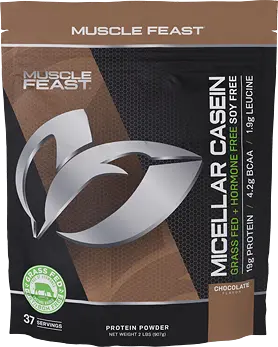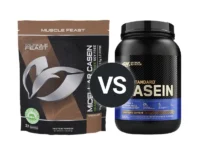Knowledge BaseYou're Questions Answered
How much protein is in casein protein powder?
Casein protein powder is a popular dietary supplement known for its slow-digesting properties, making it ideal for sustained protein release over several hours. It is derived from milk and is a rich source of high-quality protein. The protein content in casein protein powder can vary slightly depending on the product and formulation, but it generally provides a substantial amount of protein per serving.
Protein Content in Casein Protein Powder
On average, casein protein powder contains approximately 24 to 26 grams of protein per 30-gram serving (about 1 scoop). This means that casein protein powder is typically around 80-86% protein by weight. The exact protein content can vary depending on factors such as the type of casein used (micellar casein vs. caseinate), the presence of additional ingredients, and the level of processing1.
Types of Casein Protein
- Micellar Casein: This is the least processed form of casein, retaining its natural micelle structure, which allows for slow digestion and a steady release of amino acids into the bloodstream. Micellar casein typically has a slightly higher protein concentration.
- Caseinate: This form of casein is more processed and can include calcium caseinate, sodium caseinate, or potassium caseinate. It is more easily dissolved in liquids but may have a slightly lower protein content compared to micellar casein.
Nutritional Profile and Benefits
Casein protein powder provides all nine essential amino acids, making it a complete protein source. It is particularly high in glutamine, an amino acid that plays a key role in muscle recovery and immune function2. Due to its slow digestion rate, casein is often consumed before bed to provide a steady supply of amino acids throughout the night, supporting muscle repair and growth during sleep.
Usage and Considerations
Casein protein powder can be used in various ways, including as a shake, in smoothies, or as an ingredient in recipes for protein-rich snacks and meals. Its thickening properties also make it suitable for use in puddings and desserts. For individuals with lactose intolerance or milk allergies, it is important to note that casein, being a milk protein, contains lactose, although often in small amounts. Choosing lactose-free casein options can help mitigate potential digestive discomfort.
- Boirie, Y., Dangin, M., Gachon, P., Vasson, M. P., Maubois, J. L., & Beaufrère, B. (1997). Slow and fast dietary proteins differently modulate postprandial protein accretion. Proceedings of the National Academy of Sciences, 94(26), 14930-14935.
- Gleim, G. W., & McHugh, M. P. (1997). Glutamine: A conditionally essential amino acid and its role in exercise. Nutrition, 13(1), 78-83.
Related Questions

Your Answer
We are a participant in the Amazon Services LLC Associates Program, an affiliate advertising program designed to provide a means for us to earn fees by linking to Amazon.com and affiliated sites.






